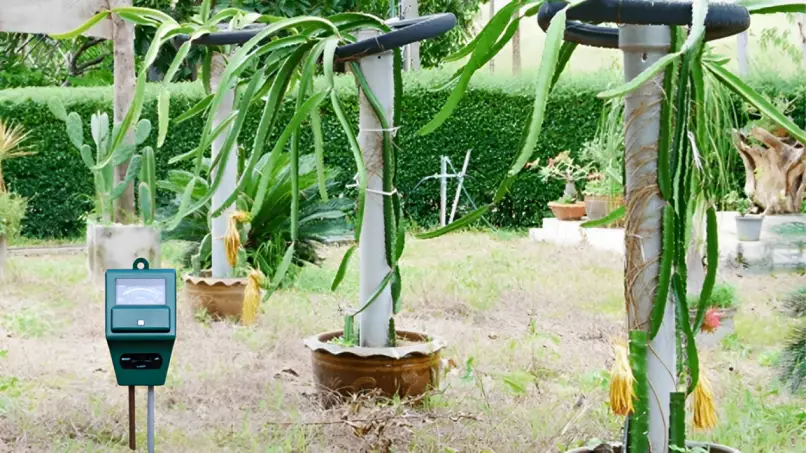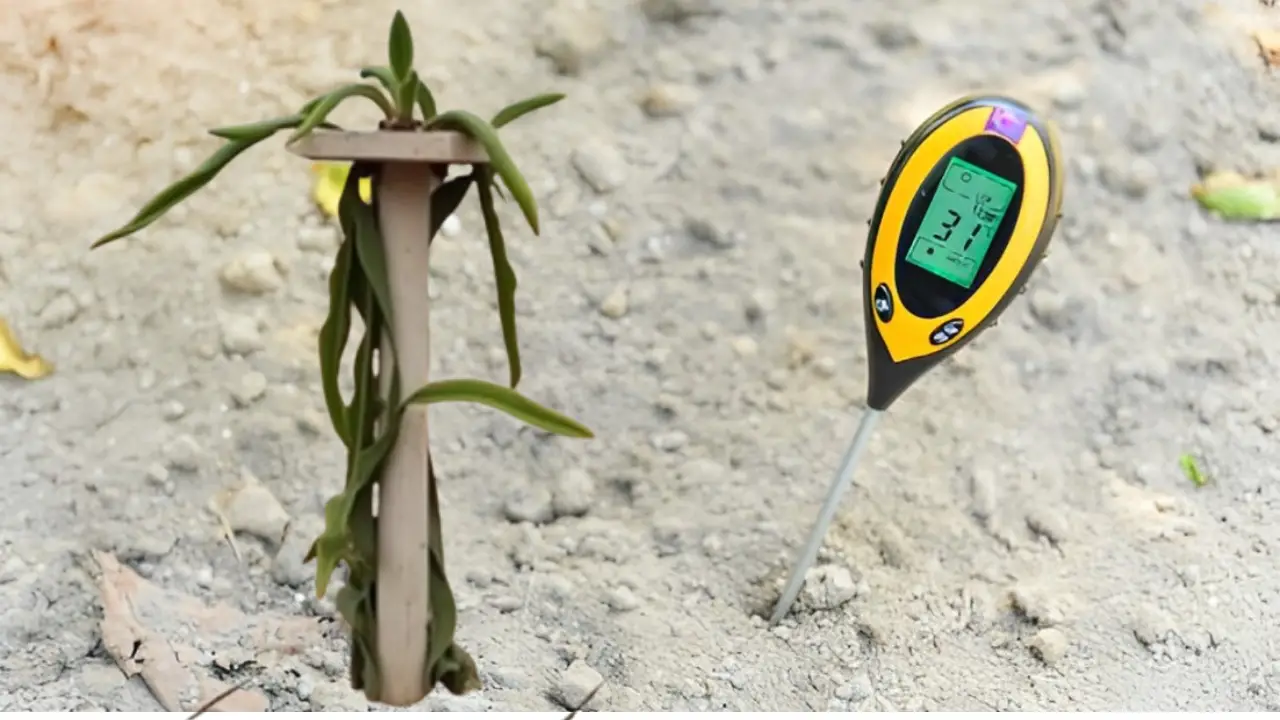Dragon fruit, also known as Kamalam fruit, has gained immense popularity worldwide due to its rich nutritional benefits and increasing market demand. One critical factor that influences the successful cultivation of dragon fruit soil ph. In this article, we will explore the importance of maintaining the right pH level for Kamalam fruit plants and how to correct your soil’s pH if it’s either too high or too low, ensuring the best possible harvest.
What is Soil pH?

Soil pH refers to the level of acidity or alkalinity in the soil, which plays a vital role in plant growth and nutrient availability. The pH scale ranges from 0 to 14, where a value of 7 is considered neutral. Soil pH can be classified as:
- Acidic: pH less than 7
- Neutral: pH 7
- Alkaline: pH greater than 7
For plants like Dragon fruit, maintaining an optimal dragon fruit soil ph is essential, as it directly impacts the root system, microbial activity, and the plant’s ability to absorb nutrients.
Dragon fruit soil requirements
For Kamalam fruit (Dragon fruit), the ideal dragon fruit soil ph. is 6.5, which is slightly acidic. At this pH level, most essential nutrients are readily available to the plant, and microbial activity is at its peak, ensuring healthy plant growth and good fruit yield.
How to Measure Soil pH
There are various methods to measure the pH of your soil:
- Using a pH Meter: Insert a pH meter into the soil as instructed, and wait for a few moments to get a reading.
- Soil Testing Kits: You can also purchase soil testing kits that are easy to use and give quick results.
- Laboratory Testing: For the most accurate results, you can send a soil sample to an agricultural laboratory for detailed analysis.
Why is a pH of 6.5 Important for Kamalam Fruit Plants?

Nutrient Availability:
- At a pH of 6.5, essential nutrients like Nitrogen, Phosphorus, and Potassium are most active and available for absorption.
- Micronutrients such as Iron and Manganese are also efficiently absorbed at this pH level, preventing deficiencies in the plant.
Microbial Activity:
- Beneficial soil microbes thrive at a pH of 6.5, helping break down organic matter and enhance soil fertility.
Root Development:
- This pH level provides the best soil structure and texture for root growth, leading to stronger and healthier plants.
Effects of Soil pH on Dragon Fruit Development
Balanced Nutrition:
- At the optimal pH of 6.5, Dragon fruit plants absorb nutrients more efficiently, promoting balanced growth and better fruit production.
Fruit Quality:
- The right dragon fruit soil ph improves the taste, color, and nutritional value of the fruit, resulting in a superior harvest.
Disease Resistance:
- A balanced pH helps the plant build stronger resistance to diseases and pests, leading to better crop yields.
What Happens if Soil pH is Too High (Alkaline)?
When soil for dragon fruit becomes too high (alkaline), it negatively affects plant health and growth. Here’s how:
- Nutrient Deficiency: Alkaline soil makes nutrients like Iron, Zinc, and Manganese less available to plants, leading to deficiencies and poor growth.
- Yellowing Leaves: A common symptom of nutrient deficiencies in alkaline soil is chlorosis, where the leaves turn yellow due to a lack of chlorophyll production.
- Reduced Fruit Production: High pH can stunt the growth of flowers and fruits, resulting in smaller fruit size and lower quality.
How to Correct High Soil pH
Add Sulfur:
- Adding sulfur to the soil is one of the most effective ways to lower soil pH. Sulfur gradually reduces the soil’s alkalinity, making it more acidic over time.
Use Organic Matter:
- Organic materials like compost, manure, and vermicompost can help balance the pH and increase soil fertility.
Apply Organic Acids:
- Using organic products like biological acids can lower the soil pH and improve its overall structure.
What Happens if dragon fruit soil ph. is Too Low (Acidic)?

ideal soil for dragon fruit
Acidic soil (pH below 6.5) can also harm Kamalam fruit plants. Here’s how:
- Root Damage: Low pH can harm the root system, dragon fruit low soil requirements leading to poor water and nutrient uptake.
- Nutrient Imbalance: In very acidic soils, some nutrients become toxic to the plants, while others become unavailable, leading to growth issues.
- Stunted Growth: Acidic soil inhibits the plant’s ability to grow properly, slowing down overall development.
How to Correct Low Soil pH
Add Lime:
- The most common method to raise the pH of acidic soil is to add lime (calcium carbonate). Lime neutralizes acidity and brings the dragon fruit soil ph. to a more balanced level.
Use Organic Matter:
- Adding compost and well-decomposed manure can help balance out the acidity and improve soil texture.
Use Bone Meal or Dolomitic Lime:
- These materials can also help raise soil pH, while simultaneously enriching the soil with nutrients like phosphorus and calcium.
Tip of the Day for New Farmers: Regularly Test Your Soil’s pH
dragon fruit soil ph. plays a vital role in the overall health and growth of your plants. It directly impacts the availability of essential nutrients, which can either promote healthy growth or lead to deficiencies. For dragon fruit farmers, maintaining the right pH level is crucial for optimal fruit production. Over time, however, soil pH can shift, often due to factors such as the use of fertilizers, irrigation methods, and environmental changes. That’s why regularly testing your soil’s pH is essential.
By testing your soil every few months, you can detect any changes in pH early on and take corrective measures before they negatively affect your crops. ideal soil for dragon fruit This proactive approach can help you maintain the ideal soil conditions for your plants, ensuring they get the nutrients they need to thrive. For example, if the pH becomes too acidic or too alkaline, plants may struggle to absorb nutrients like iron, magnesium, and potassium, which are essential for growth.
Regular soil testing also allows you to adjust your dragon fruit soil ph. with appropriate amendments. If the soil becomes too acidic, adding lime can help raise the pH, while sulfur or dragon fruit soil requirements – organic materials like peat moss can lower it if the soil becomes too alkaline. These adjustments, when done at the right time, can prevent nutrient imbalances, stunted growth, and reduced fruit yield.
For new farmers, soil pH testing doesn’t need to be complicated or expensive. Simple pH testing kits are readily available and easy to use, making it possible to monitor soil health regularly without much hassle. Keeping track of your soil’s pH ensures that your plants remain healthy, productive, and free from nutrient deficiencies.
FAQs
- Can I start Kamalam farming without testing my soil?
- It’s highly recommended to test your soil before starting Kamalam farming. Soil testing helps identify deficiencies or imbalances that could affect plant growth.
- Is a pH of 7 bad for Dragon fruit farming?
- A pH of 7 is not bad, but the ideal pH for Dragon fruit is 6.5. It’s the optimal range for nutrient absorption and microbial activity.
- What kind of soil is best for Kamalam (Dragon fruit)?
- Well-drained, slightly acidic sandy loam soil with a pH of 6.5 is ideal for Kamalam cultivation. However, any soil can work if properly tested and amended.
- Can I use chemical fertilizers to adjust soil pH?
- It’s better to use organic methods to adjust soil pH, but chemical fertilizers can be used cautiously under expert advice.
- What is the best time to test soil pH?
- Test your soil pH before planting, ideally during the offseason or when preparing the land for cultivation.
- How often should I test my soil pH?
- Soil pH should be tested annually or every two years to ensure it remains within the optimal range.
- How can I tell if my Dragon fruit plants need more nutrients?
- Symptoms like yellowing leaves, stunted growth, or poor fruit production are signs that your plants might need more nutrients or an adjustment in soil pH.
- Can I grow Dragon fruit in clay soil?
- While Dragon fruit prefers well-drained soil, you can grow it in clay soil by improving drainage and adjusting the pH to around 6.5.
- How long does it take for soil amendments like sulfur and lime to show results?
- Sulfur and lime can take several months to alter soil pH. It’s important to plan ahead and amend the soil well before planting.
- What other factors should I consider for successful Dragon fruit farming?
- Apart from soil pH, factors like irrigation, sunlight, temperature, and pest control are equally important for a successful harvest.
Conclusion
To achieve the maximum yield and best quality Kamalam (Dragon fruit), maintaining the right dragon fruit soil ph. is essential. A pH of 6.5 ensures that the plant receives the necessary nutrients, encourages healthy root growth, and increases resistance to diseases. By regularly testing and adjusting your soil’s pH, you can optimize your farming efforts and reap a bountiful harvest year after year.
By following these guidelines, new farmers can confidently start their Kamalam fruit farming journey and enjoy a successful, profitable crop. Happy farming!


1 thought on “How to Maintain Ideal Dragon Fruit Soil pH Level”